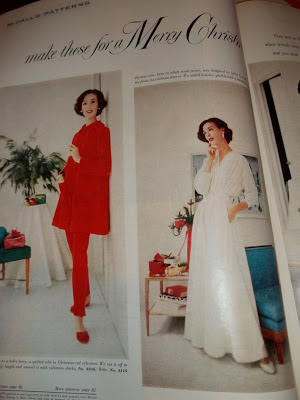Every holiday season, people say they wish that Christmas was "the way it used to be." With the help of the feline blog assistants, I decided to explore some of these old magazines on Christmas Eve day. Maybe I could see how Christmas used to be, 40 or 50 or more years ago, at least as it was presented to the public in print. I came to the conclusion that things haven't changed all that much.
Most of the old magazines in Irene's collection featured inspiring Christmas stories from contemporary writers -- Rumer Godden, Norah Lofts, Richard Armour, Ogden Nash and others were well-represented. Dr. Spock wrote an advice column for parents. (Look him up, kids. No relation to the other Spock, except that they were both good at calmly giving advice.)
Kurt Vonnegut, Jr., penned a Christmas play for children in one issue. Another Christmas play for kids featured illustrations by Joan Walsh Anglund.
Not to be outdone, the artists at the Disney studios created "A Christmas Carol" featuring a family of mice, in December 1957.
Christmas fashions, particularly for women and children, were prominently displayed. In the make-it-yourself magazines, the focus was on homemade dresses.
By contrast, the December 1957 Ladies' Home Journal featured a multi-page spread of fashions modeled by two young socialites who were sisters. This picture is of one of them -- the young Mrs. John F. Kennedy.
(McCall's magazine from the same month featured a story on "President Eisenhower's Diet." Needless to say, it did not have the same appeal. However, McCall's promoted an upcoming article in its January 1958 edition, by this young lady's husband, on "Three Women of Courage.")
All the magazines featured articles on how to decorate your home for the holidays, usually by making some of the decor yourself. This picture of a Christmas-themed living room in 1957 is a "retro" fan's dream.
Many articles explained to readers how to create their own Christmas ornaments and toys.
Of course it wouldn't be Christmas without food. All the magazines devoted a lot of space to holiday recipes. "Over 100 Tempting HOLIDAY RECIPES" read one headline. Feature stories told readers how to create the perfect holiday feast.
Millions of calories' worth of meals and treats, cheek-by-jowl with ads for tomato juice and Sucaryl and Sweeta tablets to help the reader stay slim. (That paradox hasn't changed!) One magazine advertisement suggested a set of scales (available in a variety of designer colors) as the perfect Christmas gift for the person on a diet. (I hope whoever received a device to weigh themselves for Christmas, threw it straight in the direction of the sadistic giver.) A small article, lavishly illustrated, recommended giving socks for Christmas to the man who already "has everything." So that's where the tradition started....
Even the recipes in the old advertisements are familiar.
To provide a sense of balance, magazine articles explained to parents how to make the holidays more meaningful for their kids.
Stories for children and parents to read together were significant parts of most of the Christmas magazines in the 1950s and '60s. Only they were relatively new stories back then.
The cartoon Christmas story that actually tells the real "good tidings of great joy" to all people, was the same then as it is now. Woman's Day, December 1968, featured illustrations by Charles Schulz.
Christmas commercialism was alive and well in the 1950s and '60s. Does it seem more innocent? Or is that just the voice of nostalgia speaking? Like them or not, the ads are great snapshots-in-time.
Christmas characters from TV programs were featured in 1960s print ads as well.
Ads showed appliances (washing machines, refrigerators, hand mixers) in pastel pink and turquoise blue in the late 1950s-early 1960s; they changed to gold and avocado green a few years later. Getting your family new phones for Christmas had a different (and much more iconic) look back then.
Of course, some of the things in the collection of Christmas magazines don't stand the test of time. This article, for example, explained how to make jewelry out of pop-tops from soda cans. It's just as well that we let that sleeping ghost of Christmas past, lie.
I'm grateful Irene saved her Christmas magazines, so we can read over her shoulder today. Merry Christmas, everyone.

















